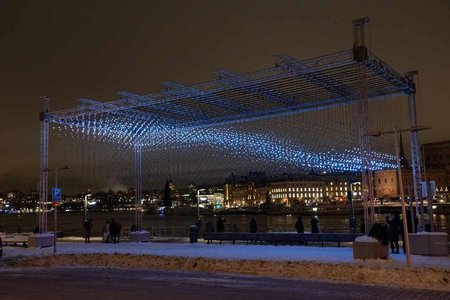Wind of Barbados turned to light in Stockholm
During the darkest time of the year, Nobel Week Lights is a free cultural experience that brings light to the city. Presented by the Nobel Prize Museum, the festival invites international and local artists, designers and students to create public light artworks inspired by the Nobel Prize laureates’ scientific discoveries, literature, and peace work.
Danish lighting and graphic designers Frederik D. Hougs and Claus Boysen have programmed their large-scale installation “Waves” so that each individual LED luminaire responds to rapidly updated climate information, such as wind speed.
“Waves” builds on Prof. Hasselmann's research by presenting a wave phenomenon using live weather data. For his contributions to the physical modeling of the Earth's climate, the quantification of natural variability, and the reliable prediction of global warming, Prof. Klaus Hasselmann, founding director of the Max Planck Institute for Meteorology, received the Nobel Prize in Physics 2021 together with Syukuro Manabe and Giorgio Parisi. He developed a model that linked together weather and climate, demonstrating how short-term phenomena such as precipitation are related to long-term developments such as ocean currents. This helped to explain why climate models can deliver reliable predictions despite short-term weather fluctuations. His methods have been used to prove that the increased temperature in the atmosphere is due to human emissions of carbon dioxide.
The data used for „Waves“ stems from the research station “Barbados Cloud Observatory” that was established by the Max Planck Institute for Meteorology together with the Caribbean Institute for Meteorology and Hydrology and several other participating institutions on the island of Barbados.
Its measurements and the continuous data set help scientists to answer long standing questions about the statistical properties of shallow cumulus clouds and their link to our changing climate. At the station, a variety of different measuring instruments contribute to the most multi-layered picture of the observed clouds and atmosphere.
Further information
Nobel Week Lights 2023, Waves
Barbados Cloud Observatory
Nobel Prize in Physics 2021 for Klaus Hasselmann
Contact
Dörte de Graaf
Communication
Max Planck Institute for Meteorology
doerte.degraaf@mpimet.mpg.de

